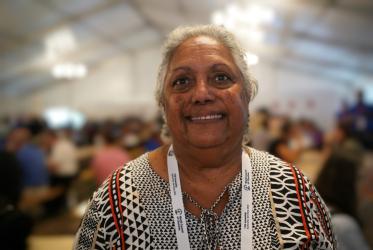WCC Central Committee meeting, 28 August - 5 September 2012
1. The World Council of Churches has a long history of concern for the Indigenous peoples of Australia. They have suffered dispossession of their lands and loss of language and culture and had to cope with decades of attempts at forced assimilation. Still today the Indigenous peoples of Australia suffer grievously in socio-economic terms, and they are seriously disadvantaged compared to other Australians.
2. Following a WCC “Living Letters” visit to Australia in September 2010, the WCC Central Committee in February 2011 approved a “Statement on the Situation of Indigenous Peoples in Australia”. This statement noted the 2007 Northern Territory Emergency Response, known as the “Intervention”, which imposed severe restrictions on the rights and freedoms of Indigenous families and communities in the Northern Territory and was highly discriminatory in nature.
3. The most objectionable factor about the Intervention is that it was imposed without any consultation with Indigenous communities and their leaders. The outcry from Indigenous communities in the Northern Territory resulted in some relief from the more discriminatory measures in the years 2007-2010, but still left most restrictions in place and no sense of partnership between Indigenous peoples and the Australian Government.
4. In April 2009 the Australian Government officially endorsed the UN Declaration on the Rights of Indigenous Peoples. Both the Australian Government and Indigenous Peoples acknowledged this as an important step in resetting the relationship between Indigenous and non-Indigenous Australians and moving forward towards a new future. However, Indigenous leaders in Australia have identified the necessity to implement the UN Declaration, particularly Article 3 which recognizes that Indigenous peoples have the right to self-determination.
5. In June 2012 the Australian Parliament approved new legislation titled “Stronger Futures in the Northern Territory”. While this legislation is less severe than the 2007 legislation, in that it removes some previous restrictions, contains fewer punitive measures against Indigenous families and communities, and commits increased amounts of financial support aimed at improving the plight of Indigenous peoples, it still disempowers Indigenous families and communities in the Northern Territory and for the first time extends some control and punitive provisions beyond the Northern Territory.
6. In the months prior to the passing of this 2012 legislation, the Australian Government did undertake a consultation process with Indigenous communities in the Northern Territory. However, Indigenous leaders throughout Australia continue to be outraged at the lack of notice taken by the Government of their views and suggestions. Indigenous communities and their leaders feel the Government approach is that of imposition, discrimination, control and punishment.
7. The UN Committee on the Elimination of Racial Discrimination has called on all parties to the International Convention on the Elimination of Racial Discrimination (ICERD) to “Ensure that members of Indigenous peoples have equal rights in respect of effective participation in public life, and that no decisions directly relating to their rights and interests are taken without their informed consent”. Indigenous leaders in Australia are extremely critical of the Australian Government for the Government’s repeated failure to abide by this call.
The Central Committee of the World Council of Churches, meeting in Kolympari, Crete, Greece, from 28 August to 5 September 2012, therefore:
A. Reaffirms its solidarity with the Indigenous Peoples of Australia, the Aboriginal and Torres Strait Islander Peoples.
B. Affirms the many leaders of Indigenous communities who have protested against those elements of the “Stronger Futures” legislation which have been implemented without any meaningful and effective negotiations with the people most affected by the legislation.
C. Expresses support for actions which empower Indigenous peoples to take control of their own lives and destinies, and which enable partnerships between Indigenous communities and the Australian Government towards culturally appropriate efforts for improvements in the areas of health, housing, education, employment, self-sufficiency and well-being of Indigenous peoples.
D. Endorses the actions of Australian churches in protesting against the “Stronger Futures” legislation and in continuing to advocate for policies that build partnerships between Indigenous communities and the Australian Government;
E. Encourages the Australian churches to give further support to the efforts of Australia’s Indigenous peoples as they seek the implementation of the UN Declaration on the Rights of Indigenous Peoples especially the right to self-determination for Aboriginal and Torres Strait Islander Peoples;
F. Urges the Australian churches to work with the Australian members of the UN Peoples’ Forum on Indigenous Issues.
G. Reiterates its call on WCC member churches to continue to uphold in prayer and to raise awareness about the specific issues facing Indigenous Peoples and to develop advocacy campaigns to support the rights, aspirations and needs of Indigenous Peoples in Australia and elsewhere.
APPROVED



